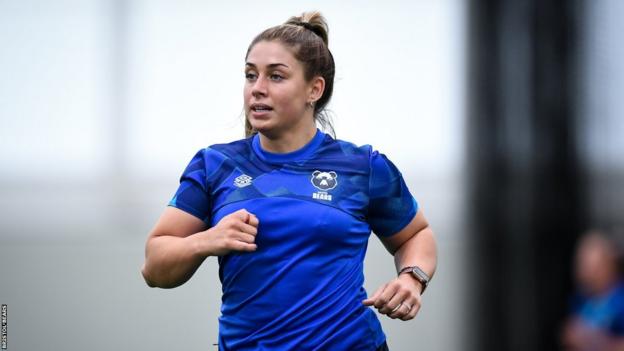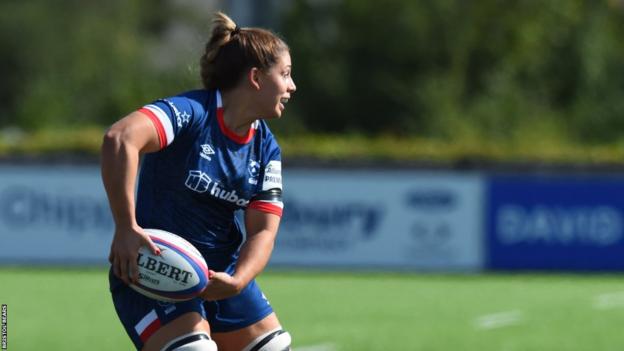Daisie Mayes: Bristol Bears flanker on playing with endometriosis
Last updated on .From the section English Rugby

Bristol Bears back-rower Daisie Mayes says using a wellness tracker has been a "game-changer" in helping maximise performance around her menstrual cycle.
She was diagnosed with endometriosis in February 2022 after years of "excruciating" menstrual pain.
Often Mayes, 27, was left unable to train or play as a result.
Since the diagnosis she has learned to manage it with the help of her club with whom she shares her cycle so they can support her during training.
"It's something that personally, and from rugby, has affected me ever since I started my period, so about 11, but I didn't really understand it at a young age," Mayes told BBC Points West.
"I don't think it's spoken about that people know what's normal and what's not normal.
"It was mainly heavy flow and also the pain, that was quite bad.
"Sometimes it was excruciating and you're trying to run and you feel like you've got a lead ball in your stomach that just keeps holding you back."
Endometriosis is a condition where tissue, similar to the lining of the womb, grows in other places such as the ovaries and fallopian tubes.
The NHS describes it as a "long-term condition that can have a significant impact" on your life.
After years of going back and forth to doctors, Mayes' diagnosis came after her cousin was found to have the condition and she could relate to the symptoms.
The diagnosis answered some of her questions and she was advised to have an IUD contraceptive implant - known as the coil - to help slow down growth of the endometriosis.
She said the procedure, carried out by a GP with no anaesthetic, was a "horrendous experience" and led to a three-month long period and continued pain.
"We were just going into our cup campaign here, which was a really good opportunity for me to get some game time and try and play some of my best rugby," Mayes continued.
"I felt really awful, my period pains were excruciating, I couldn't run, I felt like I had a fever and I wanted to be sick.
"I was bent over trying to hold my stomach because I couldn't move and in the end I had to come off, and was sat on the side of the pitch in the dugout with ice on my head and on my body because I couldn't cool down. I was so upset."
'Struggling to compete'
The experience has also impacted Mayes' mental health, causing her anxiety before matches.
"It will affect training and games. I can get quite a lot of brain fog, very fatigued," Mayes added.
"If I'm on my period or due on my period it's very hard to concentrate, especially at the level that we are where we're not fully professional - you work all day, you go to training, you've got to know your detail and you want to be on top of your game because you're not a starter and you want to compete for that, but then you're struggling."

The wellness tracker was introduced last season when the team moved to their new base at the high performance centre, and is led by the team's head of athletic performance, Gareth Harris, who has studied the impact of menstrual cycles on athletic performance.
The forms are filled out weekly by the players and feature questions around their general wellness, but also their menstrual cycle, symptoms, severity and how they feel it impacts their training.
The club can then build a profile of each player and adapt their training based on the findings.
"The biggest two things I always encourage our players to do is to talk and to track," Harris said.
"Talking gives us the ability to break down taboos and provide more support, and tracking gives us the real clear indicators of what they are experiencing - and then what symptoms we can help with and adjust our programmes to best support them."
Mayes added: "That's been a bit of game-changer for us, especially me.
"Not only is it helping me to train the best I can with this condition, but also knowing and having confidence in my coaches that I can talk to them about anything."
Mayes said attitudes and understanding towards periods in sport were changing. However, she stressed that more research and investment was needed if the the women's game is to progress.
"I think it's very important that we do talk about this in women's sport.
"It's what makes it different to men's sport and it doesn't need to be a negative thing, if anything it is a different product and we need to change the game to meet that product."


































